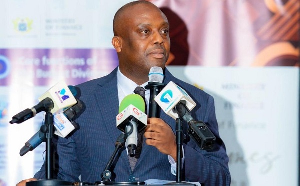Religion of Saturday, 30 May 2015
Source: GNA
Directive affects numerical strength of Catholic Diocese
A directive from the Techiman Diocese of the Roman Catholic Church to maintain the use of only “Twi” language in daily and weekly liturgies, is affecting Mass (church service) in the Diocese.
Information gathered by the Ghana News Agency (GNA) indicate that the numerical, spiritual and material strength in the Diocese is gradually diminishing since the directive was issued in August 2014.
This is because migrant Catholics who do not understand the Twi and English languages, had already stopped attending Mass.
The directive, according to Mr Francis Kuuibeterzie, the Secretary of the Transfiguration of Jesus Parish at Jema in the Kintampo South District, had also promoted tribalism within the Diocese.
He told the Ghana News Agency in an interview on Wednesday that the directive was contained in a promulgated pastoral letter and law, written by the Most Reverend Dominic Yeboah Nyarko, the Catholic Bishop of Techiman.
“Migrant faithful must not sing, read or recite any part of the liturgy in native language”, Mr Kuuibeterzie quoted portion of the letter, which according to him, was distributed among all the Priests in the Diocese.
“In order to ensure harmony and uniform pastoral practice, wherever this has not yet been enforced, we direct all priests to ensure that no part of the regular liturgy is sung, read or recited in any other language.”
He explained that majority of Catholic faithfuls in migrant catholic communities, such as Hyireso, Tanokrom, Bredi, Kintampo, Kranka, New-Longoro, Nkoranza and Tuobodom, had stopped attending daily and weekly Mass.
Mr Kuuibeterzie observed that the chunk of the migrant Catholic faithfuls (Catholic who are not natives of the Techiman Diocese), did not speak or understand Twi language, and therefore asked the Bishop’s office to rescind the decision and withdraw what he described as the ‘dictatorial law.’
“This new directive discriminates in terms of language, tribe and origin,” he said, and emphasized the importance for the Diocese to promote freedom of worship and build a united and solid body of Christ.
“All that we need is freedom of worship and flexible use of languages. If we are not restricted to Twi alone, then we shall be empowered to sing and praise God with all our hearts, minds and soul,” he added.
Mr Kuuibeterzie stated that the directive had also affected and restricted many mono-lingual ethnic settlements, such as the Mo, Gonja, Frafra, Konkonba and Dagaaba in the Diocese.
When contacted, Bishop Nyarko confirmed the directive, but explained that it was aimed at controlling and preventing pastoral confusion, especially in the liturgical life of Catholic faithful’s.
He explained that the Diocese organizes separate monthly Masses in other native languages for the Catholic migrants in the diocese.












